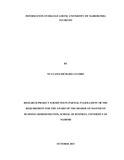| dc.description.abstract | Information Technology plays a very important role in enabling production,
processing, storing and distributing huge amounts of information every day. Recent
information technology has facilitated the exponential rate at which information is
generated allowing information users to access too much information. Despite a lot of
advantages realized from advancement of Information Technology in generating
diverse information required for knowledge gain for academicians and decision
-making for managers, the same technology has contributed a great deal towards
Information Overload. Organizations, institutions of higher learning and students
alike invest a lot of resources in terms of money, time and efforts to improve
themselves but these are neutralized by Information Overload. The purpose of this
study was to investigate existence of Information Overload among University of
Nairobi MBA students focusing on the following four objectives of the study: To establish the causes of information overload to University of Nairobi MBA students,
to determine if University of Nairobi MBA students experienced information
overloaded and up to what extent, to determine the extent of Information Overload
effect on University of Nairobi MBA students on their various activities and
interactions and finally to establish strategies applied by University of Nairobi MBA
students to combat Information Overload. This study adopted descriptive survey
design where the target population was University of Nairobi 2700 registered MBA
students. Simple random sampling technique was used to select respondents. The
researcher used a questionnaire as the research instrument which was self-administered and collected back after completion by the researcher. Collected data
was analyzed using SPSS frequency tables, Descriptive Statistics and Factor Analysis.
The findings were presented using pie chart, bar graph, frequencies tables, percentages, Means and Standard Deviations. Study findings revealed majority of
University of Nairobi MBA students were aware of Information overload and more
than 90% of them experienced information to a great extent. It was also established
that information overload affected majority of MBA students in executing their
operations and interactions to a great extent. Further, the study revealed that some
MBA students applied some strategies to manage information overload while others
did not. From the study findings, the following recommendations were made: First,
the University of Nairobi School of Business to incorporate an information literacy
course to enable MBA students learn how to handle information, secondly, school of
business MBA office to put in place information and communication policy to prevent unnecessary information overload to students. | |

